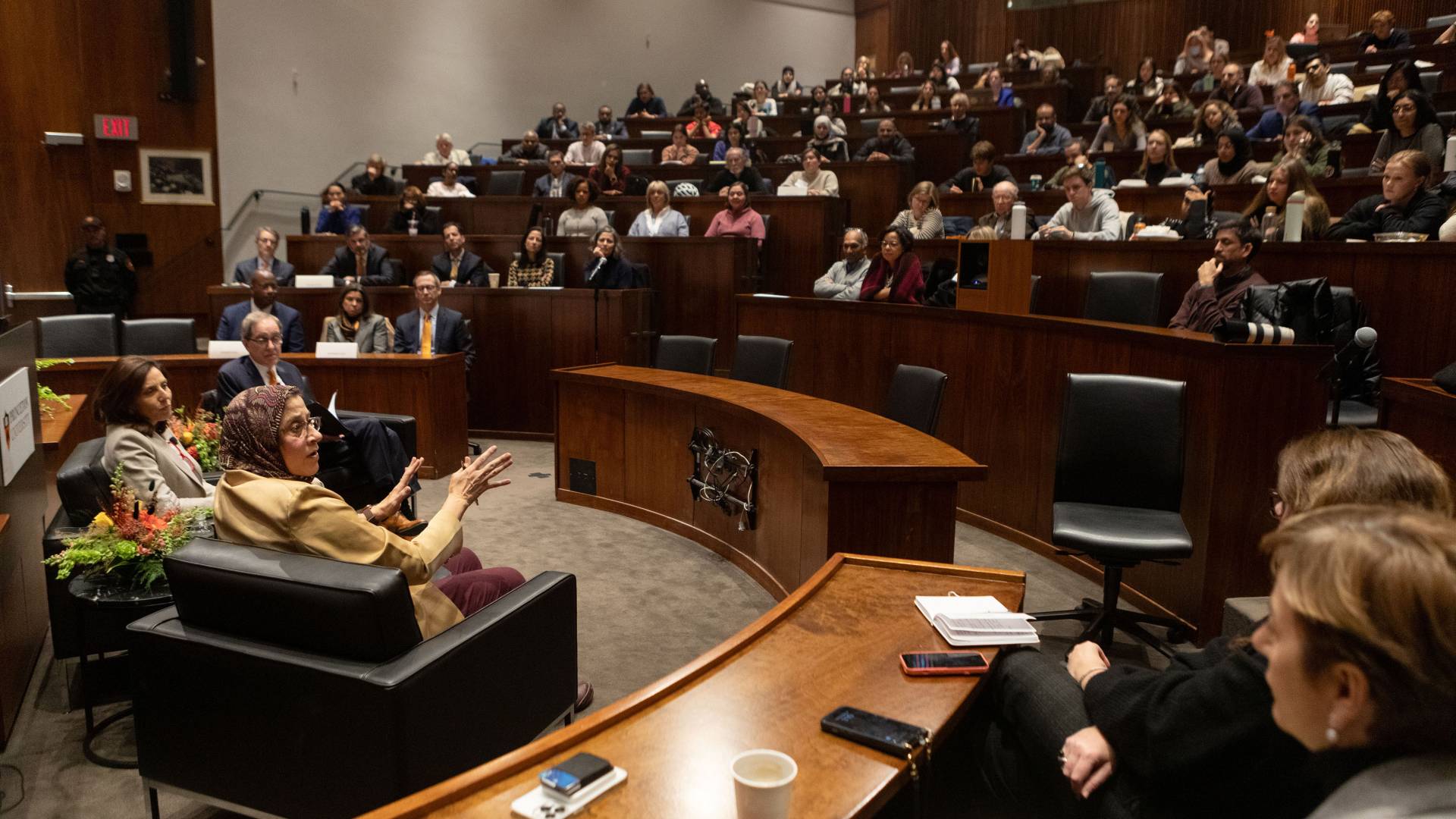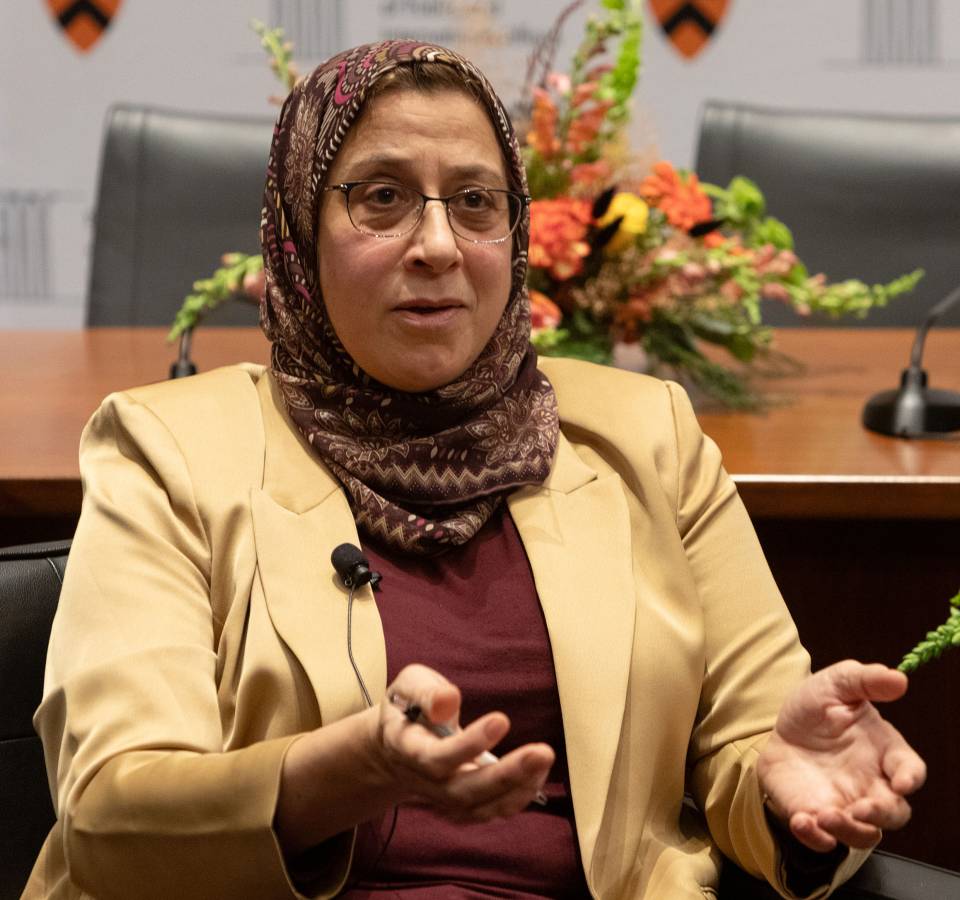Princeton and Columbia Policy School Deans Model Scholarly Discourse During Talk About Israel-Hamas War

Photo by Denise Applewhite, Office of Communications
Observing the often-vitriolic discourse that emerged in society surrounding the war between Israel and Hamas, Princeton’s Amaney Jamal and Columbia’s Keren Yarhi-Milo co-wrote a widely cited New York Times op-ed late last month about the vital role universities can play in fostering constructive dialogue on complex and difficult topics.
On Tuesday, the two policy school deans came together in a wide-ranging conversation, moderated by Princeton President Christopher L. Eisgruber, to show how they, themselves navigate this difficult territory — as scholars, long-time colleagues and friends.
Jamal, dean of Princeton’s School of Public and International Affairs (SPIA), and Yarhi-Milo, dean of Columbia’s School of International and Public Affairs, spoke at SPIA’s Arthur Lewis Auditorium in the first of two events expanding on their Times essay, “The Discourse is Toxic. Universities Can Help.” A second discussion will take place Thursday on Columbia’s campus.

The scholars addressed an audience of students, faculty and staff inside Arthur Lewis Auditorium. The talk was organized by SPIA.
Photo by Denise Applewhite, Office of Communications
“One of the things we are here to learn more about today is precisely how to grapple with complexity and nuance at a time of heightened tensions and in a way that leads to new and productive insights,” Eisgruber said in his introduction.
“The sanctity of a university is in its ability to make sure that we can always teach about a diverse set of perspectives — that we can have difficult conversations on our campuses,” Jamal said. “If we can’t do that in our universities, then where are we going to be able to do that?”
“In our op-ed we talked about the importance of freedom of speech, freedom of organization and ensuring that our universities remain spaces where people can talk about those difficult conversations,” she added.
Yarhi-Milo said she and Jamal — both political scientists in addition to their other roles — have a responsibility to educate and to elevate the discourse about the Israel-Hamas war. “We can step in and use this moment to talk about this conflict, bring more knowledge, understanding, perspective and civil dialogue,” Yarhi-Milo said.
In their Oct. 30 New York Times commentary, the two scholars noted that “as leaders of public policy schools, we train the leaders of tomorrow to think creatively and boldly. It starts with countering speech that is harmful; modeling civic dialogue, mutual respect and empathy; and showing an ability to listen to one another.”
While Jamal is Palestinian-American and Yarhi-Milo is Israeli-American, they approached the Nov. 28 discussion as academics committed to scholarly research and thoughtful debate, as Eisgruber noted in his introduction.
“They are not here today to speak on behalf of any national or religious or political identity,” he told the audience of students, faculty and staff. “Rather they are scholars with deep expertise in the region as well as leaders of major policy schools that are playing host to a lot of important, and also terribly difficult, conversations about what’s happening … today.”
Speaking to Jamal and Yarhi-Milo, Eisgruber added: “Part of the strength of your op-ed is that it acknowledges your respective identities as Palestinian and Israeli and that it’s a model of constructive and courageous conversations about a very difficult topic.”
Throughout the event, the two deans provided important historical background about the longstanding Israeli-Palestinian conflict, the failed promise of the Oslo Accords, and the current war following Hamas’ Oct. 7 terror attacks in Israel.
Jamal, the Edwards S. Sanford Professor of Politics and professor of politics and international affairs, is the former director of Princeton’s Mamdouha S. Bobst Center for Peace and Justice. She is the co-founder and co-principal investigator of the Arab Barometer Project.
Yarhi-Milo, the Adlai E. Stevenson Professor of International Relations at Columbia, is an expert in international security, crisis decision making and political psychology. Before becoming dean, she led Columbia’s Arnold A. Saltzman Institute of War and Peace Studies. Yarhi-Milo previously spent a decade on the Princeton faculty.
 Jamal is also the Edwards S. Sanford Professor of Politics and professor of politics and international affairs at Princeton. She joined Yarhi-Milo in a similar conversation on Columbia’s campus on Nov. 30.
Jamal is also the Edwards S. Sanford Professor of Politics and professor of politics and international affairs at Princeton. She joined Yarhi-Milo in a similar conversation on Columbia’s campus on Nov. 30.Photo byDenise Applewhite, Office of Communications
“Do we have personal feelings about this? Of course,” Yarhi-Milo said. “But in terms of the scholarship, we are both political scientists by training. … This is a conversation that I will have based on arguments, evidence, literature. That is how I approach it.”
She noted that she and Jamal lead international policy schools where faculty and students from across the world come together to share their different experiences and perspectives. “I am a dean of everyone and they all need to feel that I am there for all of them,” she said.
The deans said a commitment to learning is important in volatile times, and college campuses should be environments where people can express differing opinions in respectful ways.
As with many conflicts, Jamal said, polarizing voices about the current war often get outsize attention on social media and in the news media.
“The more extremist voices … have taken over this conflict and the silent majority around the bell curve have been silenced and a little bit pushed off stage,” she said. “And I think this is a moment when we want to reclaim our position on the stage.”
When one student at the assembly asked about a way forward in the Middle East, both Jamal and Yarhi-Milo said that peace is possible but that it requires tremendous work.
“I want to make sure that every student hears this,” Jamal said. “Peace is not simply hiding out there and that if you call it, it is going to come and present itself. Peace requires work. Peace requires leadership, and all of you who are going to be future policymakers need to think about it concretely.”
She added: “My hope is that everybody… starts to think about a peaceful solution. How do we hold our leaders accountable to that solution? How do we educate people about that solution? How do we learn from other sort of intractable conflicts that became peaceful?”
Yarhi-Milo said it will be the passionate and thoughtful students like the ones in the audience who can help pave a path forward as future leaders.
“I love seeing students caring about what is happening. The worst thing is political apathy,” she said. “We can have difficult conversations. We might disagree, but we might learn a lot from one another.”
